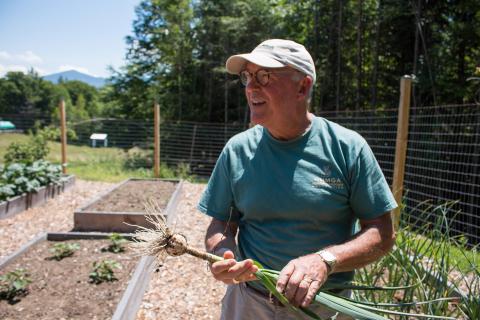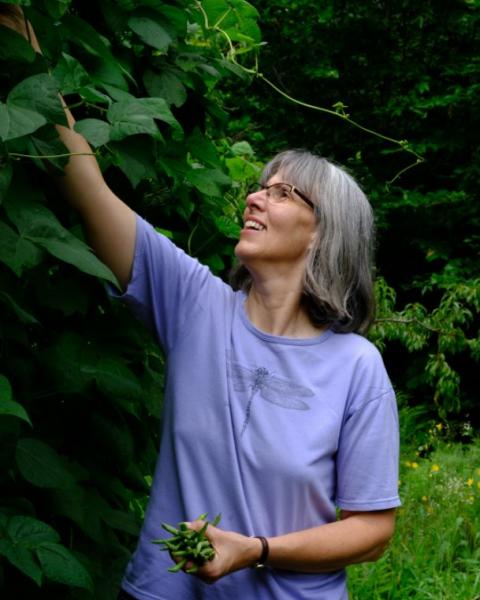Russ Gaitskill's Camp Garden Blueprint

Russ Gaitskill moved to New Hampshire in 2001 from Kentucky. In addition to bringing his professional skills as CEO of Garnet Hill, he also brought his love of gardening to the Granite State. Having been raised on a farm, growing things came naturally to him.
Early in his time in New Hampshire, Russ became familiar with the Copper Cannon Camp in Bethlehem. It is the only residential camp in the state that offers tuition free sessions for underserved NH youth and Russ was drawn to their mission. After retiring in 2014, he took the Master Gardener class and chose to create a garden at the camp as his internship project.
To Russ, a camp garden made sense because the kids are around during the prime growing season, unlike many school gardens. Engaging children in all aspects of the garden was a goal for him so they could learn about how plants grow and expand their exposure to fresh produce and healthy eating.
Copper Cannon Camp sessions are only one week long so Russ worked out ways for kids to plant successive crops. Every camp group has designated time to work in the 29 raised beds that make up the garden, which they call “The Growing Space.” They plant some things but harvest others that were planted by kids that came to earlier sessions. Every camper is able to witness plant life cycles and parts – seeds, stems, flowers, fruits, even if they can’t observe an individual plant over an entire season.
Over the years Russ and the campers have experimented with different plants. A bed of peppermint and spearmint have become a favorite. Campers pick the leaves to flavor their water since carbonated beverages are not allowed at camp. They also do taste tests with different kinds of tomatoes, peppers and edible flowers. The location of the garden, in the center of the camp near the dining hall, provides an opportunity for the campers to freely graze. Campers are willing to try things that they have grown and as a result overcome some of the misconceptions about what they don’t like to eat.
About 70-80% of the salad ingredients and many of the vegetables that are served in the dining hall come from the camp garden, including peas, beans, potatoes, squash and onions. Camp Director Pete Christnacht said, “parents report that their children eat more salads and vegetables at home after spending time at camp.” The impact of the garden program goes beyond the week at camp, building healthier eating habits, which is a primary goal of The Growing Space.
Russ is quick to state that from the start, the garden has been a collaborative effort. Support from local businesses, the Rotary, Elks, NH Master Gardener Association and many individuals made the infrastructure possible. The camp staff are also an integral part of the team. Russ provides training to them so they can reinforce the message of growing healthy plants for healthy people. They also learn gardening skills which can be shared and utilized in future years and experiences.
A great deal of planning was required to start and implement The Growing Space. In the early years, Russ put in 40-50 hours at the garden. Those hours are fewer now, partly due to additional help, but he still has ideas for expansion. Blueberry bushes and bramble fruit, as well as an irrigation system, are in the plans. Russ would like to see other camps take his “blueprint” and try starting a camp garden. True to the mission of Master Gardeners, sharing his experience is a great way to expand the impact and reap an additional harvest from The Growing Space.
